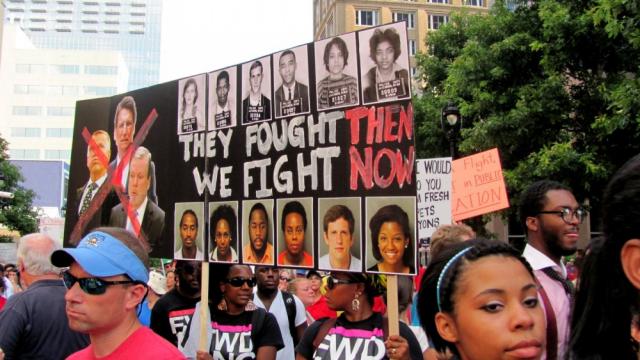
A federal appeals court has blocked two key elements of a new law introduced by Republicans in North Carolina that civil rights groups have criticized as a brazen attack on the ability of African Americans to vote.
In a two-to-one majority ruling, the Fourth Circuit U.S. Court of Appeals reinstated the right to register to vote and to cast a ballot on the same day – known as same-day registration – and the ability to vote outside a citizen’s home precinct.
Those facilities had been removed under a controversial new law, HB 589, whose Republican sponsors said was necessary to ensure the integrity of the voting process and whose detractors said was a political ruse to make it more difficult for largely Democratic-voting black people to get to the polling stations.
The reversal comes in time for the midterm elections in November which are being closely watched as a potentially critical swing state. However, other central reforms brought under HB 589 have been allowed to stand and will be in play in November, including a reduction of early voting days by a full week and the banning of registration drives for 16- and 17-year-olds before they come of age.
Writing the majority ruling, Judge James Wynn began by stating that the “right to vote is fundamental.” He went on to rule that an earlier ruling by a district court that allowed HB 589 to go ahead in its entirety had misapplied the law and amounted to an abuse of the court’s discretion.
The judge said that the district court ruling had failed to take into account the history of discrimination against black voters in North Carolina. Wynn cited the experience of Rosanell Eaton who in 1939 was told she would only be allowed to vote if she could recite perfectly the preamble to the US constitution.
He also underlined the fact that the district court had agreed with the NAACP, the department of justice and other groups challenging HB 589 that an end to same-day registration and out-of-precinct voting would disproportionately affect African American voters.
He added: “The district court failed to recognize, much less address, the problem of sacrificing voter enfranchisement at the altar of bureaucratic (in) efficiency and (under-) resourcing.”
The appeal court ruling, which the state of North Carolina can itself challenge in front of a full hearing of the same court, still leaves intact several of the most controversial aspects of HB 589. The law was rushed through the North Carolina general assembly immediately after the U.S. Supreme Court lifted controls placed on largely Southern jurisdictions under the 1965 Voting Rights Act that prevented them from tampering with electoral procedures without prior approval of the federal government.
The features that will still come into play in November include the reduction of early voting days from 17 to 10; an expansion of the practice of challenging the voter eligibility of people standing in line at polling stations; restrictions on voter registration drives for under-18s; and a soft rollout for the voter identification requirement that will come into effect in 2016. In all these aspects, the appeals court found that a preliminary injunction was not merited.
The Reverand William Barber, president of the North Carolina branch of the NAACP which was a plaintiff in the action, welcomed the ruling but said the fight was not yet over.
“We will charge ahead until this bill is permanently overturned in the full trial next summer. Until then, we will continue to take our movement to the streets to make sure all people in our democracy have an equal voice in this and all elections,” he said in a statement.
In her dissenting opinion, Judge Diana Motz warned that such a late change to the voting procedures, with the mid-term elections only five weeks away, would spread confusion. It would cause “not only uncertainty about the status of particular voting procedures, but also general frustration with and distrust of an election process changed on the eve of the election itself.”
3 WAYS TO SHOW YOUR SUPPORT
- Log in to post comments











